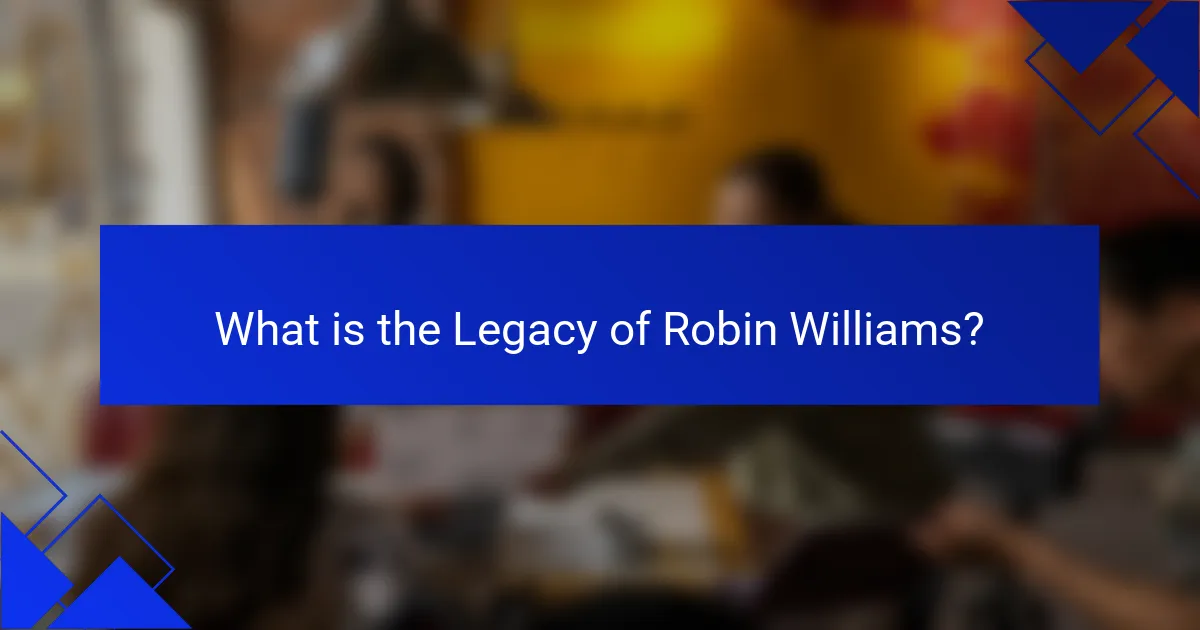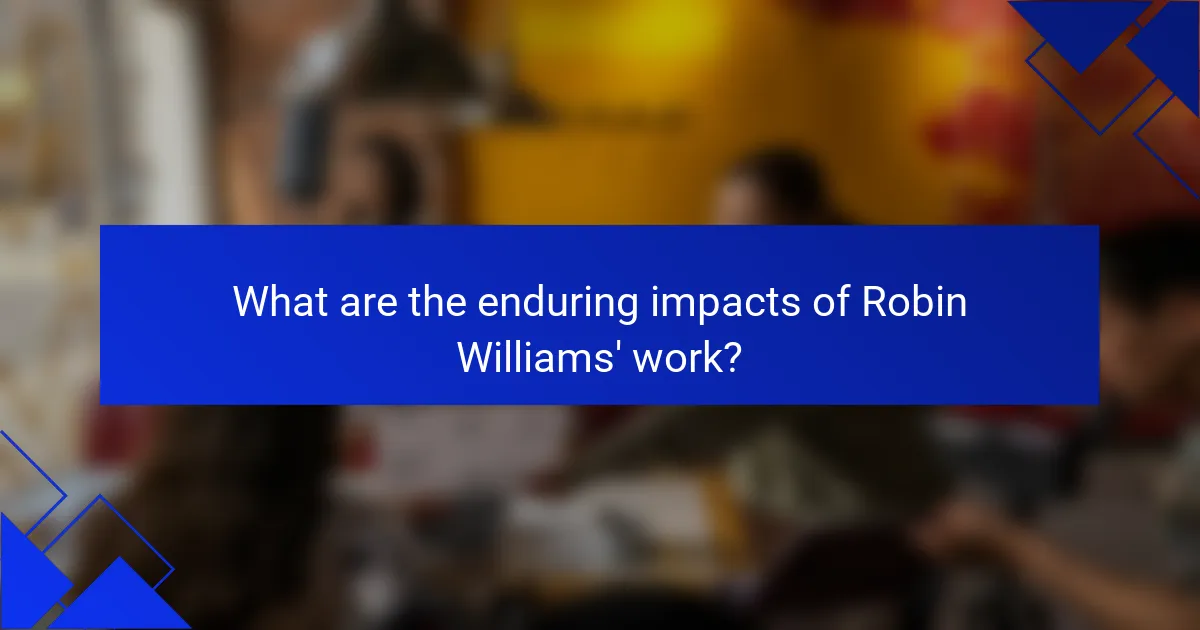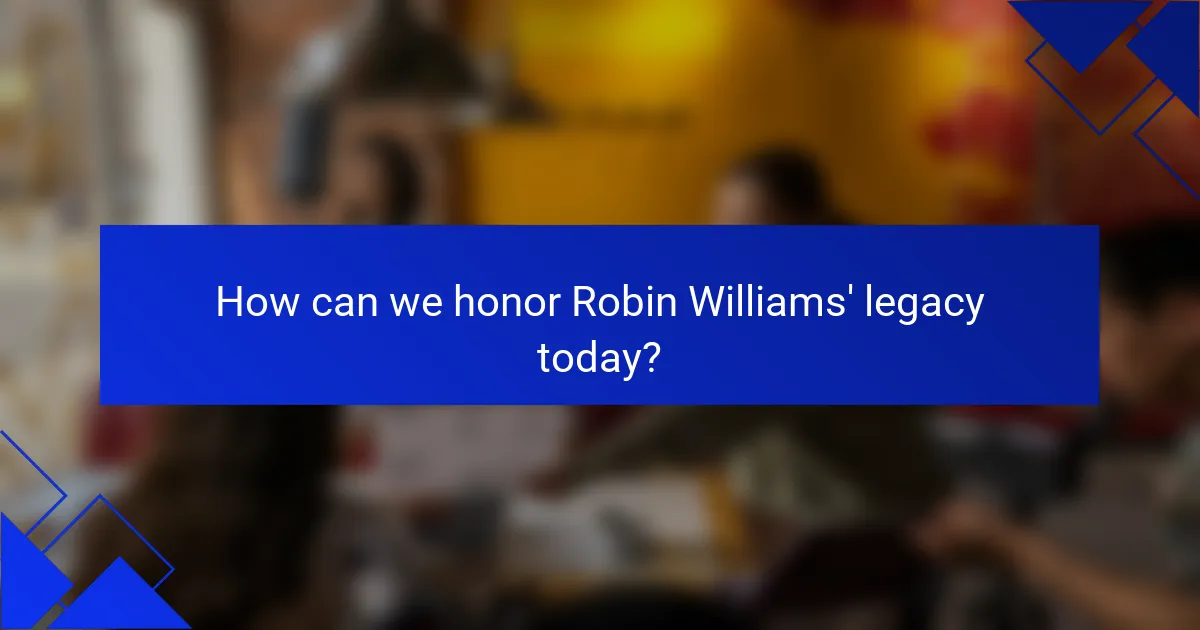
What is the Legacy of Robin Williams?
The legacy of Robin Williams encompasses his profound impact on comedy, film, and mental health awareness. Williams was a groundbreaking comedian known for his improvisational skills and energetic performances. He starred in iconic films such as “Good Will Hunting,” which earned him an Academy Award. His ability to blend humor with deep emotional resonance set him apart in dramatic roles. Williams openly discussed his struggles with mental health, helping to destigmatize these issues. His advocacy work raised awareness about depression and suicide prevention. The outpouring of grief and tributes after his passing in 2014 highlighted his influence on both fans and fellow artists. Williams’ legacy continues to inspire discussions about mental health and the importance of compassion.
How did Robin Williams become a comedic genius?
Robin Williams became a comedic genius through his unique improvisational skills and charismatic stage presence. He honed his craft in the stand-up comedy scene during the 1970s. His ability to blend humor with poignant observations resonated with audiences. Williams often drew on personal experiences, making his comedy relatable. He showcased versatility by transitioning between stand-up, television, and film. His role in “Mork & Mindy” propelled him to fame and showcased his improvisational talent. Williams received multiple awards, including two Emmy Awards and five Grammy Awards, validating his impact on comedy. His dynamic performances and ability to connect emotionally with audiences solidified his legacy as a comedic legend.
What are the key characteristics of Robin Williams’ comedic style?
Robin Williams’ comedic style is characterized by rapid-fire delivery and improvisation. He often employed a stream-of-consciousness approach in his routines. This technique allowed him to seamlessly transition between topics. His humor frequently included a mix of absurdity and poignant observations. Williams was known for his ability to impersonate various characters and celebrities. This talent added depth to his performances. His energetic physicality and expressive [censured] gestures enhanced his comedic impact. He often addressed serious subjects with humor, blending comedy and drama effectively.
Which performances highlight his comedic genius?
Robin Williams’ comedic genius is highlighted in performances such as “Mrs. Doubtfire,” “Good Morning, Vietnam,” and “Aladdin.” In “Mrs. Doubtfire,” he showcased his ability to blend humor with heartfelt emotion. His portrayal of a father disguising himself as a nanny was both hilarious and touching. In “Good Morning, Vietnam,” Williams demonstrated his improvisational skills as a radio DJ during the Vietnam War. This role earned him critical acclaim and showcased his unique comedic timing. In “Aladdin,” his voice performance as the Genie brought a dynamic and whimsical energy to the character. Williams’ improvisations in this role created memorable moments that are still celebrated today. Each of these performances exemplifies his talent for making audiences laugh while also connecting with them on a deeper level.
What are the notable dramatic roles played by Robin Williams?
Robin Williams played several notable dramatic roles throughout his career. In “Good Will Hunting,” he portrayed Sean Maguire, a therapist who helps a troubled genius. This role earned him an Academy Award for Best Supporting Actor. In “Dead Poets Society,” he played John Keating, an inspiring English teacher who encourages students to embrace poetry and seize the day. His performance was critically acclaimed and remains iconic. In “One Hour Photo,” he took on the role of Sy Parrish, a lonely photo technician who becomes obsessed with a family. This role showcased his ability to portray darker characters. In “Awakenings,” he starred as Leonard Lowe, a patient who awakens from a decades-long coma. His performance alongside Robert De Niro highlighted his range as an actor. These roles demonstrate Williams’ versatility and depth as a dramatic actor.
How did Robin Williams transition from comedy to drama?
Robin Williams transitioned from comedy to drama through deliberate choices in his career. He began with a strong foundation in stand-up comedy and television, notably on “Mork & Mindy.” His comedic style showcased his improvisational skills and energetic persona. This background allowed him to gain fame and recognition in Hollywood.
Williams sought to challenge himself and expand his range as an actor. He took on dramatic roles in films like “Dead Poets Society” and “Good Will Hunting.” These performances showcased his ability to convey deep emotion and complexity. Critics praised his dramatic range, often highlighting his depth in portraying vulnerable characters.
Williams’ transition was marked by a desire for artistic growth and authenticity. He believed that comedy and drama are interconnected, allowing for a richer storytelling experience. His successful shift earned him an Academy Award for Best Supporting Actor in “Good Will Hunting.” This recognition solidified his status as a versatile actor capable of both comedy and drama.
What awards did he receive for his dramatic performances?
Robin Williams received several prestigious awards for his dramatic performances. He won an Academy Award for Best Supporting Actor for “Good Will Hunting” in 1998. Additionally, he earned two Primetime Emmy Awards for his dramatic roles. One of these was for “The Morgan Show” in 1987, and the other was for “Homicide: Life on the Street” in 1996. Williams was also nominated for multiple Golden Globe Awards for his performances in dramatic films, including “Dead Poets Society” and “Good Will Hunting.” His ability to convey deep emotion in dramatic roles was widely recognized by critics and audiences alike.
How did Robin Williams advocate for mental health awareness?
Robin Williams advocated for mental health awareness through his openness about his struggles. He candidly discussed his battles with depression and anxiety in interviews. Williams used his platform to destigmatize mental health issues. He often emphasized the importance of seeking help. His portrayal of characters with mental health challenges raised awareness. Williams supported various mental health organizations, including the “Bring Change to Mind” campaign. His tragic death highlighted the need for ongoing conversations about mental health. This sparked greater public discourse on the topic, inspiring many to seek help.
What personal experiences influenced his advocacy efforts?
Robin Williams’ advocacy efforts were influenced by his struggles with mental health and addiction. His experiences with depression and anxiety shaped his understanding of these issues. Williams openly discussed his battles with substance abuse, which began in his youth. He sought treatment multiple times throughout his life. His personal journey made him empathetic towards others facing similar challenges. This empathy fueled his commitment to raise awareness about mental health. Williams used his platform to advocate for mental health resources and support systems. His tragic death in 2014 highlighted the importance of mental health discussions, further solidifying his legacy as an advocate.
How did his advocacy impact public perceptions of mental health?
Robin Williams’ advocacy significantly changed public perceptions of mental health. He openly discussed his struggles with depression and anxiety. This transparency helped destigmatize mental health issues. His candidness encouraged others to seek help. Public awareness increased due to his influence. Mental health organizations reported higher engagement after his advocacy. His legacy continues to inspire conversations about mental health today.

What are the enduring impacts of Robin Williams’ work?
Robin Williams’ work has enduring impacts on comedy, film, and mental health awareness. His unique blend of humor and emotion resonated with audiences globally. Williams transformed the landscape of stand-up comedy with his improvisational style. He brought depth to dramatic roles, earning him critical acclaim and multiple awards. His portrayal of characters often addressed complex human emotions, influencing future actors. Williams was an outspoken advocate for mental health, raising awareness about depression and suicide. His openness about personal struggles encouraged others to seek help. The legacy of his work continues to inspire artists and advocates in various fields.
How has Robin Williams influenced future generations of comedians?
Robin Williams has profoundly influenced future generations of comedians through his innovative style and emotional depth. His improvisational skills set a new standard for spontaneity in comedy. Williams often blended humor with poignant moments, demonstrating that comedy could address serious topics. Comedians like Jim Gaffigan and Sarah Silverman cite him as a major inspiration. His ability to transition between comedy and drama showcased versatility that many aspire to emulate. Williams’ energetic performances encouraged a more physical and expressive approach to comedy. His candid discussions about mental health have opened dialogues for comedians about vulnerability. This legacy continues to shape comedic voices today.
What techniques did he use that are emulated by modern comedians?
Robin Williams used improvisation, rapid-fire delivery, and character work that are emulated by modern comedians. His improvisational skills allowed him to create spontaneous humor, often enhancing scripted material. Williams’ rapid-fire delivery kept audiences engaged, creating a unique rhythm in his performances. He often portrayed multiple characters within a single routine, showcasing versatility. This technique inspired many comedians to adopt character-based humor. His ability to blend comedy with poignant moments is also widely imitated, adding depth to performances. These techniques contributed to his lasting influence on the comedy landscape.
How do his comedic and dramatic roles continue to resonate today?
Robin Williams’ comedic and dramatic roles resonate today due to their emotional depth and relatability. His performances often blended humor with poignant moments, reflecting the complexities of human experience. For instance, in “Good Will Hunting,” Williams portrayed a therapist who connects deeply with his troubled patient. This role highlighted the importance of empathy and understanding in mental health.
Moreover, his comedic roles, such as in “Mrs. Doubtfire,” showcased his ability to tackle serious themes like family dynamics and identity through humor. This duality allows audiences to find solace and laughter in difficult subjects.
Williams’ legacy also influences contemporary discussions about mental health. His openness about personal struggles has inspired many to seek help. The ongoing popularity of his films demonstrates their lasting impact on culture and society.
What role did Robin Williams play in changing the narrative around mental health?
Robin Williams played a significant role in changing the narrative around mental health. He openly discussed his struggles with depression and addiction. His candidness helped destigmatize mental health issues. Williams used his platform to raise awareness about mental health. His portrayal of characters facing similar challenges resonated with many. The film “Good Will Hunting” highlighted the importance of therapy and emotional support. His tragic death in 2014 sparked conversations about mental health. Many fans and advocates cited his influence in encouraging others to seek help.
How did his openness about his struggles inspire others?
His openness about his struggles inspired others by fostering awareness and reducing stigma around mental health issues. Robin Williams openly discussed his battles with depression and addiction. This candidness resonated with many individuals facing similar challenges. His willingness to share personal experiences encouraged others to seek help. Williams’ story highlighted that mental health struggles are common and can affect anyone, regardless of success. This normalization of mental health discussions led to increased conversations and support networks. His legacy continues to motivate individuals to prioritize mental health and advocate for others facing similar issues.
What initiatives did he support to promote mental health awareness?
Robin Williams supported several initiatives to promote mental health awareness. He was a vocal advocate for mental health issues. Williams participated in campaigns aimed at reducing the stigma surrounding mental illness. He supported organizations like the National Alliance on Mental Illness (NAMI). His involvement helped raise significant funds for mental health programs. Williams also emphasized the importance of seeking help and treatment. He used his platform to share personal experiences with mental health challenges. His efforts contributed to increased public dialogue about mental health.

How can we honor Robin Williams’ legacy today?
We can honor Robin Williams’ legacy today by promoting mental health awareness. Williams was an advocate for mental health, openly discussing his struggles with depression. Supporting mental health organizations, such as the National Alliance on Mental Illness, continues his mission. Additionally, sharing his films can inspire joy and laughter, reflecting his comedic genius. Engaging in community events that focus on mental health can further his impact. Participating in discussions about mental health can also help reduce stigma. By remembering his contributions, we keep his spirit alive.
What lessons can we learn from Robin Williams’ life and career?
Robin Williams’ life and career teach us the importance of mental health awareness. He openly struggled with depression and addiction. His battles highlight the need for compassion and understanding towards those facing similar challenges. Williams used humor to connect with people and to cope with his own pain. This demonstrates the power of laughter in healing. His philanthropic efforts emphasized the significance of giving back to the community. Williams’ diverse roles showed that vulnerability can lead to profound performances. He left a legacy that encourages open dialogue about mental health issues.
How can we apply his approach to comedy and drama in our own lives?
We can apply Robin Williams’ approach to comedy and drama by embracing vulnerability and authenticity in our expressions. His performances often showcased genuine emotions, blending humor with poignant moments. Engaging in personal storytelling can help us connect with others. We can also use humor as a coping mechanism during challenging times. Studies show that laughter reduces stress and improves mental well-being. Additionally, exploring diverse perspectives in our narratives can foster empathy. By balancing lightheartedness with deeper themes, we can create more relatable and impactful experiences. This approach encourages open dialogue about mental health, promoting awareness and understanding.
What steps can we take to continue his advocacy for mental health?
To continue Robin Williams’ advocacy for mental health, we can implement several key steps. First, we should raise awareness through educational programs about mental health issues. These programs can help reduce stigma and promote understanding. Second, we can support mental health organizations through fundraising and volunteer efforts. This support can enhance their capacity to provide services. Third, we can encourage open conversations about mental health in communities and workplaces. This promotes a culture of acceptance and support. Fourth, we can leverage social media to share stories and resources related to mental health. This can reach a wider audience and foster connections. Lastly, we can advocate for policy changes that improve mental health services and access. This can lead to more comprehensive care for those in need. Each of these steps builds on the legacy of Robin Williams, who emphasized the importance of mental health awareness and support.
What are practical ways to celebrate Robin Williams’ contributions?
Host a film screening of Robin Williams’ iconic movies. This can include classics like “Good Will Hunting” and “Mrs. Doubtfire.” Invite friends and family to share their favorite scenes. Create a discussion space to talk about his impact on film and comedy.
Organize a tribute event in local theaters or community centers. This can involve stand-up performances or talent showcases inspired by Williams’ style. Encourage participants to express their creativity in ways that honor his legacy.
Participate in mental health awareness campaigns. Robin Williams was a strong advocate for mental health. Supporting organizations like the National Alliance on Mental Illness can help continue his mission.
Create a social media campaign to share quotes and clips from his performances. Use hashtags to engage a wider audience. This can spark conversations about his influence and the importance of mental health.
Establish a scholarship in his name for aspiring actors and comedians. This can provide financial support for education in the performing arts. It honors his commitment to nurturing new talent.
Volunteer for charities that align with his values. Williams supported various causes, including children’s health and education. Engaging in community service reflects his spirit of giving back.
How can we support mental health organizations in his honor?
We can support mental health organizations in his honor by donating funds directly to these organizations. Financial contributions help provide essential services and resources for those in need. Participating in fundraising events raises awareness and encourages community involvement. Volunteering time and skills can also make a significant impact. Many organizations rely on volunteers for various programs. Sharing mental health resources on social media spreads awareness and reduces stigma. Engaging in conversations about mental health encourages others to seek help. Supporting mental health initiatives creates a lasting legacy that aligns with his advocacy efforts.
What events or tributes are dedicated to celebrating his legacy?
Annual events and tributes celebrate Robin Williams’ legacy. The “Robin Williams Tribute” event occurs each year in various locations. This event features performances by comedians and actors honoring his work. The “Robin Williams Foundation” hosts charity events to support mental health awareness. These gatherings promote dialogue around mental health, reflecting Williams’ advocacy. Additionally, fans organize online memorials on social media platforms. These tributes often share favorite moments and quotes from his films. The “Robin Williams Film Festival” showcases his cinematic contributions. Such events keep his memory alive and inspire new generations.
The main entity of the article is Robin Williams, a renowned comedian and actor known for his significant contributions to comedy, film, and mental health advocacy. The article explores Williams’ comedic genius, highlighting his improvisational skills, memorable performances, and transition to dramatic roles that showcased his emotional depth. It also examines his advocacy for mental health awareness, detailing his openness about personal struggles with depression and addiction, and the lasting impact of his legacy on public perceptions of mental health. Additionally, the article discusses ways to honor his contributions and continue his advocacy efforts.
